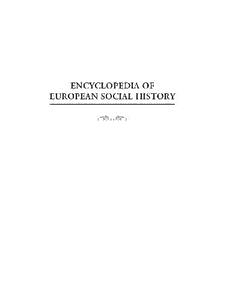
Encyclopediaclopedia of European Social History PDF
2988 Pages·2000·30.95 MB·English
Most books are stored in the elastic cloud where traffic is expensive. For this reason, we have a limit on daily download.
Preview Encyclopediaclopedia of European Social History
Description:
This encyclopedia approaches and presents modern European social history from several complementary perspectives. Broad essays in the first volume provide foundational information for readers new to social history or the history of countries or regions or major topics. Those essays explain the methods of social history (e.g., cliometrics, gender theory, microhistory), the sociohistorical periods into which modern Europe can be divided (e.g., Renaissance, Enlightenment, post-World War II), and the formative social and cultural influences in various regions or countries. Anyone who reads the insightful, analytical 12-page essay on the Balkans will understand how complex and perhaps ultimately intractable that troubled region's problems are and long have been.The second through fifth volumes carry the remainder of the set's 209 essays, all of similar depth and quality. These are organized into 19 topical sections covering, among other subjects, ''Rural Life,'' ''Social Structure,'' ''The Family and Age Groups,'' ''Work,'' ''Religion,'' and ''Everyday Life.'' Specific article topics include ''Agriculture,'' ''Alcohol and Temperance,'' ''Holidays,'' ''Literacy,'' ''Men and Masculinity,'' ''Nationalism,'' and ''Preindustrial Manufacturing.'' Every signed article, most by academics at universities in the English-speaking world, concludes with see also references to related articles and a bibliography of relevant works. Books and English-language publications predominate in the bibliographies.Judiciously chosen photographs, reproductions of period paintings and publications, and maps illustrate the articles. These range as widely as European history, from a painting depicting the execution of England's Charles I to Mickey Mouse on parade at Euro-Disney. Social history lends itself to the grand panorama as well as to small things emblematic of an age or topic. Sidebar articles present those things, covering, for example, revolutionary France's Liberty Tree tradition, a brief history of the English public school institution, and advice to fifteenth-century widows in France to avoid remarriage. The sixth volume carries nearly 300 biographies of individuals ''important in social history.'' These have been culled from Gale publications such as Contemporary Authors, Encyclopedia of World Biography, and Historical World Leaders. The source of each is noted.All of these varied contents are accessible through a thorough index. It identifies references to tables, maps, illustrations, or sidebars by presenting their volume-page citations in italics.By design and through execution of that design, the encyclopedia serves multiple purposes. Its foundational essays can be used to introduce students — even students studying areas and periods other than modern Europe — to the concepts and methods of social history. Its country and regional essays supplement textbooks and provide overviews and context for other historical approaches, such as diplomatic or military history. And its topical essays provide in-depth analysis and exposition of significant issues in European social history. All in all, the encyclopedia does not just fill a void in the reference literature; it fills it masterfully. Recommended for academic and large public libraries. The publisher designates the set for high-school use as well, although that group may find some sections heavy going.
See more
The list of books you might like
Most books are stored in the elastic cloud where traffic is expensive. For this reason, we have a limit on daily download.
